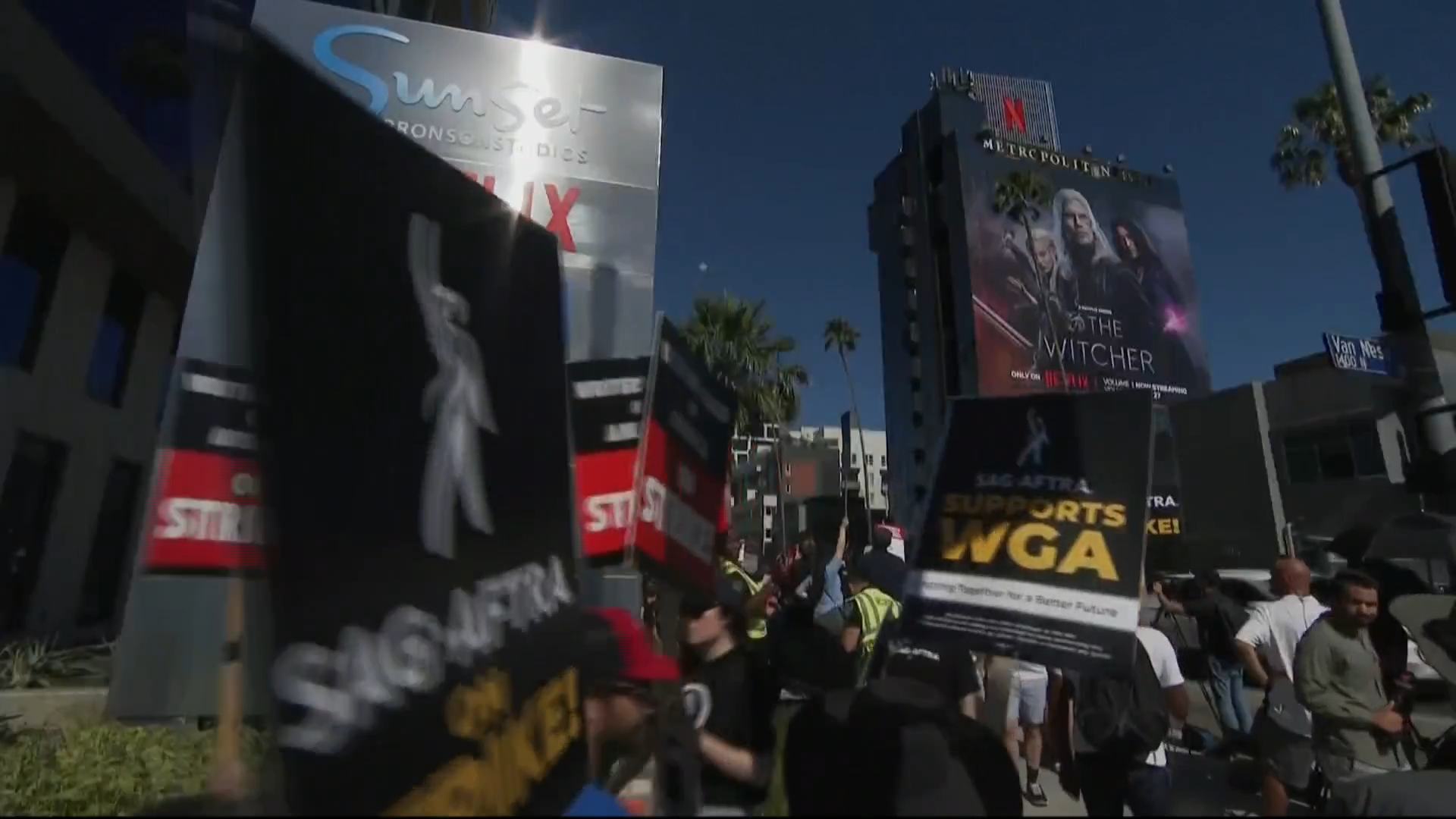Hollywood Production At Standstill Amidst Actors' And Writers' Strike

Table of Contents
The Writers' Strike: Key Demands and Fallout
The WGA strike, which began in May 2023, highlights the precarious position of writers in the age of streaming. Their demands center on several crucial areas:
Fair Wages and Residuals in the Streaming Era
Streaming services have fundamentally altered the television landscape, but the compensation models haven't kept pace. Traditional television relied on residuals—payments to writers each time their work aired. Streaming, however, often pays a single lump sum, regardless of viewership. This drastically reduces writers' earnings, especially for successful shows with millions of viewers.
- The Problem: Writers are struggling to make a living wage, as streaming platforms prioritize profit margins over fair compensation for the creative talent driving their success.
- The Demand: The WGA is demanding a fairer share of streaming revenue, ensuring residuals reflect the actual viewership of their work. This includes advocating for transparent reporting of streaming numbers.
- The Impact: The inability to earn a sustainable income is forcing many talented writers to leave the industry, threatening the future quality and diversity of television and film. While precise figures are difficult to obtain, anecdotal evidence abounds of writers struggling to afford basic necessities.
AI and the Future of Screenwriting
The rise of artificial intelligence (AI) in scriptwriting poses a significant threat to writers' livelihoods. The WGA is actively pushing back against the studios' potential use of AI to generate scripts, fearing it could replace human writers altogether.
- The Concern: AI-generated scripts could reduce the demand for human writers, potentially leading to mass unemployment in the industry. Furthermore, the ethical implications of using AI to create stories raise significant concerns about originality, authorship, and creative control.
- The Demand: The WGA seeks to prevent studios from using AI-generated material as a substitute for human writers and to establish safeguards that protect writers' intellectual property rights.
- The Impact: This dispute highlights the crucial conversation that needs to be had about AI's role in creative industries and the need for ethical guidelines to protect human creativity.
Minimum Staffing Levels and Working Conditions
The WGA also addresses the issue of minimum staffing levels on productions. Understaffing leads to longer working hours, increased pressure, and compromised script quality.
- The Problem: Inadequate staffing levels contribute to burnout and undermine the creative process, ultimately affecting the quality of the final product. Writers often have to take on additional responsibilities beyond their core job description.
- The Demand: The WGA is calling for reasonable staffing levels to ensure a healthy and sustainable work environment for all writers.
- The Impact: Better working conditions lead to higher quality scripts and a more productive work environment for everyone involved in the production process.
The Actors' Strike: Unifying with Writers for Change
SAG-AFTRA joined the WGA on the picket lines, demonstrating a powerful united front against the studios. Their demands mirror many of the writers' concerns, further solidifying the impact of Hollywood production at a standstill.
Fair Compensation and Streaming Residuals
Actors, like writers, are facing reduced residuals in the streaming era. The traditional model of paying actors based on broadcast viewership no longer applies, leaving many with unpredictable and unsustainable incomes.
- The Problem: The shift to streaming has significantly decreased actors' residual payments, making it difficult to maintain a stable career.
- The Demand: SAG-AFTRA seeks fair compensation models that reflect the significant viewership of streaming content and account for inflation.
- The Impact: This is creating financial hardship for many actors, particularly those who rely on residuals to supplement their incomes.
Self-Tape Auditions and Working Conditions
The increase in self-tape auditions, while offering convenience for studios, is detrimental to actors' careers. It reduces opportunities for in-person auditions and feedback, and often requires significant expenses on the actors' part.
- The Problem: Self-tape auditions limit actors' opportunities and place an unnecessary financial burden on them. It reduces professional interaction with casting directors and directors, hindering the development of their craft.
- The Demand: SAG-AFTRA is pushing for more in-person auditions and improved working conditions, including safety measures on set and fairer treatment of actors.
- The Impact: A fair and professional audition process is crucial to actors' livelihoods and career growth.
The Impact on SAG-AFTRA Members
The strike is having a profound impact on the lives of SAG-AFTRA members. Many are facing financial hardship, and the union is providing support to its members, but the long-term consequences remain uncertain.
- The Problem: Many actors rely on project-to-project work, leaving them vulnerable during extended production shutdowns.
- The Demand: The union is negotiating for a sustainable future that ensures actors can earn a living wage while working safely and ethically.
- The Impact: The strike underscores the precarious nature of work in the entertainment industry and the need for stronger protections for actors.
Economic Impact of the Hollywood Production Shutdown
The Hollywood production at a standstill is not just impacting creatives; it's having a ripple effect throughout the economy.
Financial Losses for Studios and Production Companies
The production halt translates to significant financial losses for studios and production companies. Delayed releases, missed revenue opportunities, and lost investment are among the consequences.
- The Losses: Estimates of financial losses are in the billions of dollars, impacting major studios and independent productions alike.
- The Ripple Effect: Related businesses, such as catering, transportation, and equipment rental companies, are also experiencing significant losses.
- The Impact: The economic downturn is being felt across the entire entertainment ecosystem.
Impact on Local Economies
Communities heavily reliant on Hollywood productions are facing job losses and economic hardship. The impact goes beyond just the film industry, affecting local businesses and families.
- The Problem: Thousands of jobs are at risk, affecting not only actors and writers but also crew members, technicians, and support staff.
- The Impact: The long-term economic consequences for these communities could be significant.
The Future of Hollywood Production: Navigating the Strike's Aftermath
The writers and actors' strikes represent a critical turning point in the entertainment industry. The key demands highlight the urgent need for fair compensation, protection against AI, and improved working conditions for all creative professionals. The sheer scale of the Hollywood production at a standstill underscores the significance of the issues at stake. The outcome of this strike will shape the future of Hollywood for years to come. It's crucial to stay informed about the negotiations and support fair labor practices within the entertainment industry. Visit the WGA and SAG-AFTRA websites for updates and to learn how you can help resolve the Hollywood production at a standstill situation and ensure a fair and sustainable future for creative professionals.

Featured Posts
-
 Village Roadshow And Alcon 417 5 Million Deal Finalized
Apr 24, 2025
Village Roadshow And Alcon 417 5 Million Deal Finalized
Apr 24, 2025 -
 Strategic Partnership Saudi Arabia And India To Establish Two Oil Refineries
Apr 24, 2025
Strategic Partnership Saudi Arabia And India To Establish Two Oil Refineries
Apr 24, 2025 -
 India Market Analysis Whats Driving The Recent Nifty Rally
Apr 24, 2025
India Market Analysis Whats Driving The Recent Nifty Rally
Apr 24, 2025 -
 John Travolta Pogledajte Koliko Je Njegova Kci Ella Odrasla
Apr 24, 2025
John Travolta Pogledajte Koliko Je Njegova Kci Ella Odrasla
Apr 24, 2025 -
 Mark Zuckerbergs Facebook In The Trump Era Challenges And Opportunities
Apr 24, 2025
Mark Zuckerbergs Facebook In The Trump Era Challenges And Opportunities
Apr 24, 2025
